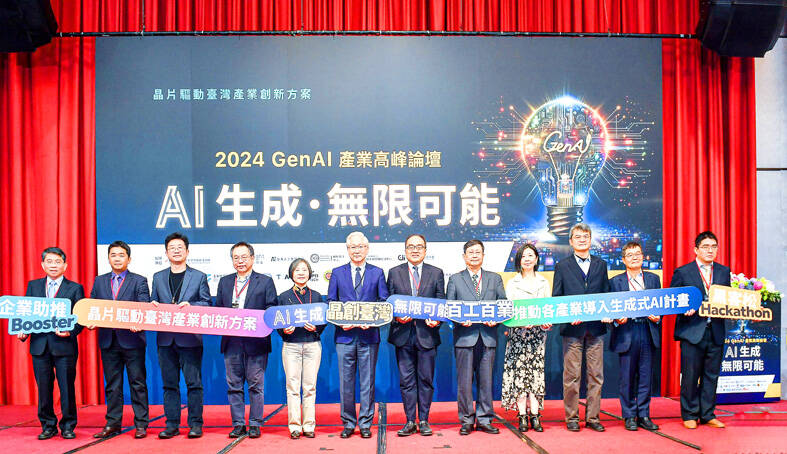Taiwan is one of the first countries to benefit from the artificial intelligence (AI) boom, but because that is largely down to a single company it also represents a risk, former Google Taiwan managing director Chien Lee-feng (簡立峰) said at an AI forum in Taipei yesterday.
Speaking at the forum on how generative AI can generate possibilities for all walks of life, Chien said Taiwan Semiconductor Manufacturing Co (TSMC, 台積電) — currently among the world’s 10 most-valuable companies due to continued optimism about AI — ensures Taiwan is one of the economies to benefit most from AI.
“This is because AI is starting a revolution in the information technology industry, which means the central processing units (CPUs) the world used to rely on for computing in computers need an update for the new AI era, and Taiwan’s chips are crucial for the production of the new graphics processing units (GPUs),” he said.

Photo courtesy of National Taiwan University
“Taiwan’s PC industry also sees ample opportunities in AI servers,” he added.
However, as TSMC’s market value is almost Taiwan’s annual GDP, “it is also a top risk factor — relying on one single industry or even one single company,” he said.
Chien told the audience that chips are not the “oil” of the 21st century, rather data is, an idea supported by the fact that several of the world’s top 10 most valuable companies are data companies such as Microsoft Corp, Apple Inc, Alphabet Inc, Meta Platforms Inc and Amazon.com Inc.
In the AI era, “the real oil is data, and semiconductors are just a conduit,” he said.
However, Chien found that Taiwan is not keeping pace in terms of familiarizing itself with data-based generative AI, symbolized by the use of AI-powered ChatGPT.
According to a survey conducted last year, “the US users of the chatbot account for about 11 percent, followed by India, Japan, Indonesia and the Philippines, while few Taiwanese utilize the interface,” he said.
He warned that “as generative AI is now best at reading and generating synopses for you, if this work has not been done for marketing or analysis in your company, you are already on the back foot.”
Chien said Taiwanese society is still not learning to interact with AI, a new technological trend that is set to impact 300 million jobs worldwide, according to a Goldman Sachs Group Inc report.
A Bloomberg ranking that placed Taiwan 14th out of 33 (higher than Japan and China) in terms of countries benefiting from AI was mainly based on Taiwan’s ability to adapt.
Chien said this means that Taiwan has a strong manufacturing-based economy that has so far absorbed the impact of AI, which has negatively affected economies that rely more on knowledge-based jobs.
Of particular note is that Taiwan’s score in “innovation” and “diffusion” are decisively lower, he added.
“It is not a tool gap but a knowledge gap if the tools are already there but people are not using them,” Chien said.

When Lika Megreladze was a child, life in her native western Georgian region of Guria revolved around tea. Her mother worked for decades as a scientist at the Soviet Union’s Institute of Tea and Subtropical Crops in the village of Anaseuli, Georgia, perfecting cultivation methods for a Georgian tea industry that supplied the bulk of the vast communist state’s brews. “When I was a child, this was only my mum’s workplace. Only later I realized that it was something big,” she said. Now, the institute lies abandoned. Yellowed papers are strewn around its decaying corridors, and a statue of Soviet founder Vladimir Lenin

UNIFYING OPPOSITION: Numerous companies have registered complaints over the potential levies, bringing together rival automakers in voicing their reservations US President Donald Trump is readying plans for industry-specific tariffs to kick in alongside his country-by-country duties in two weeks, ramping up his push to reshape the US’ standing in the global trading system by penalizing purchases from abroad. Administration officials could release details of Trump’s planned 50 percent duty on copper in the days before they are set to take effect on Friday next week, a person familiar with the matter said. That is the same date Trump’s “reciprocal” levies on products from more than 100 nations are slated to begin. Trump on Tuesday said that he is likely to impose tariffs

HELPING HAND: Approving the sale of H20s could give China the edge it needs to capture market share and become the global standard, a US representative said The US President Donald Trump administration’s decision allowing Nvidia Corp to resume shipments of its H20 artificial intelligence (AI) chips to China risks bolstering Beijing’s military capabilities and expanding its capacity to compete with the US, the head of the US House Select Committee on Strategic Competition Between the United States and the Chinese Communist Party said. “The H20, which is a cost-effective and powerful AI inference chip, far surpasses China’s indigenous capability and would therefore provide a substantial increase to China’s AI development,” committee chairman John Moolenaar, a Michigan Republican, said on Friday in a letter to US Secretary of

Taiwan Semiconductor Manufacturing Co’s (TSMC, 台積電) market value closed above US$1 trillion for the first time in Taipei last week, with a raised sales forecast driven by robust artificial intelligence (AI) demand. TSMC saw its Taiwanese shares climb to a record high on Friday, a near 50 percent rise from an April low. That has made it the first Asian stock worth more than US$1 trillion, since PetroChina Co (中國石油天然氣) briefly reached the milestone in 2007. As investors turned calm after their aggressive buying on Friday, amid optimism over the chipmaker’s business outlook, TSMC lost 0.43 percent to close at NT$1,150